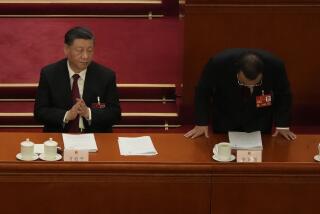Statesman’s Death Seen as Boost to China’s Jiang
- Share via
BEIJING — The death over the weekend of one of the last remaining political contemporaries of China’s late “paramount leader,” Deng Xiaoping, will probably strengthen President Jiang Zemin’s hold on power in the world’s most populous country, analysts said Monday.
Peng Zhen, one of the so-called Eight Immortals in China because of his role in the Communist takeover of 1949 and his enduring influence, died late Saturday. He was 95.
Peng’s passing leaves the way clearer for Jiang and the second generation of Chinese leaders to cement their control in the wake of Deng’s death in February. Only three of the Eight Immortals--whose age and history in Chinese politics ensure that their voices are still heard--remain alive as potential challengers to Jiang’s authority behind the scenes.
“There is one less senior elder who can have influence” in Communist Party politics, said one political analyst, who described Peng’s death as “a boon” for Jiang.
Peng’s official obituary, published Monday and approved by the Beijing leadership, took pains to note that the former head of the National People’s Congress “resolutely supported the central collective leadership with Comrade Jiang Zemin at the core.” The obituary praised Peng as a “great proletarian revolutionary” who was a “major founder of the socialist legal system in China.”
Ironically, however, he also was a backer of Deng’s capitalist-style reforms, although he expressed strong reservations about their pace during the 1980s. Likewise in his sometimes contradictory career, Peng joined Deng in taking a tough stance against pro-democracy protesters in Beijing’s Tiananmen Square in 1989 but was the chief architect of a fledgling democracy program in China’s villages.
Peng officially retired from politics a decade ago but surfaced occasionally to write articles or offer opinions on policies.
With his death, the surviving members of the old guard are Bo Yibo, 88, a former finance minister; Song Renqiong, 93, a former military official; and former President Yang Shangkun, who at 89 is the most robust as well as the most likely of the trio to try to challenge Jiang.
Yang, a military strongman whom Deng removed from the presidency to make way for Jiang, is viewed as a conservative who once held designs on Deng’s spot as senior leader.
As for Peng, his career and Deng’s ran on parallel tracks. Both were early members of the Chinese Communist Party. Both worked their way up the ladder in the 1950s and early 1960s. But both ran afoul of Mao Tse-tung and his wife during the convulsive Cultural Revolution of 1966-76, when Peng was stripped of the mayoralty of Beijing, a job he had held for 15 years.
In 1978, after Mao’s death and Deng’s ascension, the old charges against Peng of reactionary crimes and thinking were tossed out. He rejoined the upper echelon of politics as the elected chairman of the National People’s Congress standing committee in 1983, making him China’s top legislator.
More to Read
Sign up for Essential California
The most important California stories and recommendations in your inbox every morning.
You may occasionally receive promotional content from the Los Angeles Times.














